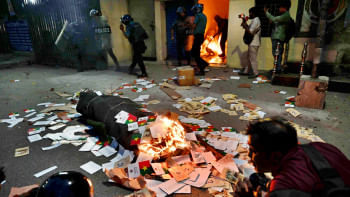Ramadi falls to militants
Shia militias converged on Ramadi yesterday in a bid to recapture it from jihadists who dealt the Iraqi government a stinging blow by overrunning the city in a deadly three-day blitz.
The loss of the capital of Iraq's largest province was Baghdad's worst military setback since it started clawing back territory from the Islamic State group late last year.
Days after a rare message from ISIS supremo Abu Bakr al-Baghdadi urging mass mobilisation, the group came close to also seizing one of Syria's most famed heritage sites, ancient Palmyra, but the army pinned it back.
Iraqi Prime Minister Haider al-Abadi had been reluctant to deploy Shia militias to Anbar province for fear of alienating its overwhelmingly Sunni Arab population.
He favoured developing locally recruited forces, a policy that had strong US support.
But militia commanders yesterday said that Ramadi's fall had shown that the government could not do without the Popular Mobilisation units (Hashed al-Shaabi).
Various militias announced they had units already in Anbar -- including around the cities of Fallujah and Habbaniyah -- ready to close in on Ramadi and engage the city's new masters.
A spokesman for Ketaeb Hezbollah, one of the leading Shia paramilitary groups, said his organisation had units ready to join the Ramadi front from three directions.
"Tomorrow, God willing, these reinforcements will continue towards Anbar and Ramadi and the start of operations to cleanse the areas recently captured by Daesh will be announced," Jaafar al-Husseini told AFP, using an Arabic acronym for ISIS.
Asaid Ahl al-Haq, one of the groups that has most routinely been accused of abuses, said it was discussing the details of its deployment with the government.
The fall of Ramadi, some 100 kilometres (60 miles) west of Baghdad, came when beleaguered security forces pulled out of their last bases on Sunday.
The jihadists used several waves of suicide car bombs to thrust into government-controlled neighbourhoods on Thursday and Friday.
The black flag of ISIS was soon flying over the provincial headquarters and, with reinforcements slow to come, thousands of families fled the city.
Anbar officials said at least 500 people died in three days.
Muhannad Haimour, adviser to the Anbar governor, said fighting was continuing in some pockets of the city. Iraqi military officials said all main security bases had been abandoned.

 For all latest news, follow The Daily Star's Google News channel.
For all latest news, follow The Daily Star's Google News channel. 



Comments